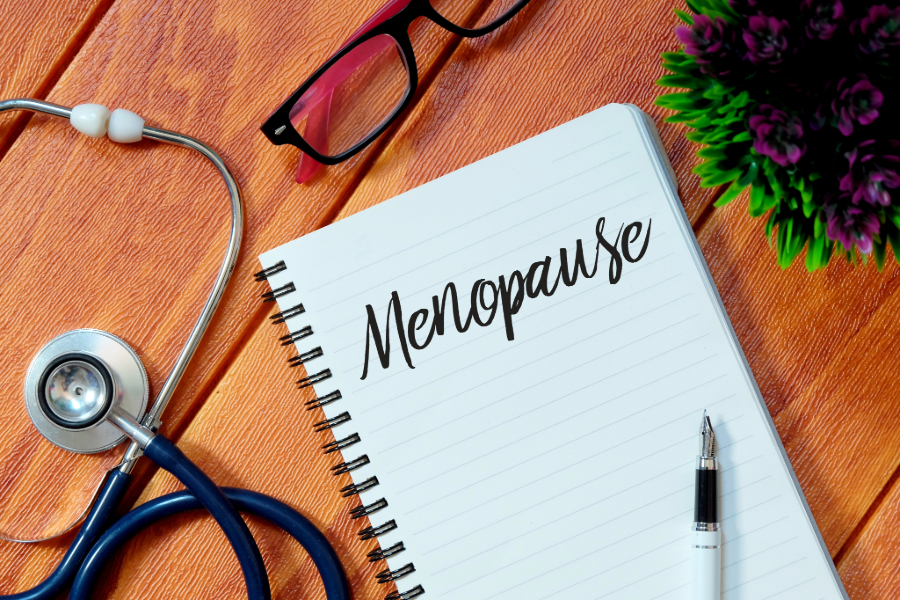Oral health and menopause: What you should know
Posted on June 5, 2025 in Healthy You

Menopause is a natural milestone for women, marking the end of a woman's menstrual cycle. The transition to menopause brings a variety of changes due to declining hormone levels, which can impact different areas of the body. And you may be surprised to learn that these hormone changes can also affect your oral health.
Quick facts about menopause
- The transition to menopause usually begins between the ages of 45 and 55, with 52 being the average age of American women reaching menopause.1
- Menopause is officially diagnosed when a woman has gone 12 months in a row without a period.1
- By 2025, an estimated 1.1 billion women will be in menopause or will be postmenopausal.2
- Menopause symptoms, such as hot flashes, irregular periods and sleep problems, can last anywhere from 2 to 8 years.1
How menopause affects oral health
Hormonal changes during menopause, namely steep drops in the hormone estrogen, can lead to several oral health issues:
- Dry mouth: Lower estrogen levels can lower saliva production, leading to dry mouth. Saliva plays a big role in washing away food particles and bacteria, and it eases acids in your mouth. A lack of saliva increases your risk of cavities and gum disease.
- Gum disease: Studies have shown that menopause can make women more susceptible to gum inflammation, which can progress to severe gum disease (also called periodontal disease) and even tooth loss if not treated.3
- Bone loss: Estrogen helps maintain bone density throughout your body, including in the jaw. A drop in estrogen can lead to bone loss, increasing your risk of loose teeth.
- Burning mouth syndrome: Some women going through menopause may experience a burning sensation in their tongue, gums or lips, which is known as burning mouth syndrome. This is caused by changing hormone levels.
Delta Dental is raising awareness
To shed light on the important connection between menopause and oral health, Delta Dental contributed to the PBS documentary, “The (M) Factor: Shredding the Silence on Menopause.” The film premiered on October 17, 2024, ahead of World Menopause Day, and aimed to educate and empower women in any stage of their menopause journey.
Sarah Chavarria, CEO and President of Delta Dental of California and Affiliates, and Teri Barichello, DMD, Vice President and Chief Dental Officer of Delta Dental of Oregon and Alaska shared their expertise in the documentary. They discussed how menopause impacts women’s oral and overall health, and emphasized the importance of regular dental visits during this significant life stage.
3 ways to take charge of your oral health
If you are going through menopause, the three steps below will help you protect your oral health and ease the transition.
- Stay hydrated: You can keep dry mouth at bay simply by drinking plenty of water. If you want to stimulate even more saliva production, chew sugar-free gum or suck on lozenges.
- Keep up with your at-home oral hygiene routine: Brush twice a day with fluoride toothpaste and floss daily to keep your gums and teeth healthy. Having a solid dental routine at home is a strong defense against hormone changes that may affect your mouth.
- Visit your dentist regularly: Twice-yearly dental check-ups are especially important during the menopause transition because your dentist can help detect early signs of gum disease, dry mouth or bone loss. The earlier you find these problems, the easier and less expensive they are to treat.
If you notice changes in your oral health, don’t hesitate to bring them up to your dentist during your next visit. Many women (93%, according to a recent Delta Dental survey4) say they would find it helpful to receive tailored advice on managing their oral health during menopause.
Menopause brings many changes, but you can maintain a healthy smile for years to come with the right knowledge and care. To learn more about “The (M) Factor,” visit TheMFactorFilm.com or stream the documentary on PBS.org. And if you need help finding a dentist near you who can help care for your mouth during menopause and beyond, visit Delta Dental of Iowa’s online Find a Provider tool.
SOURCE:
Grin Magazine
REFERENCES:
- National Institute on Aging
- Shifren, J. L., & Gass M. L. S., NAMS Recommendations for Clinical Care of Midlife Women Working Group. (2014). The North American Menopause Society recommendations for clinical care of midlife women. Menopause, 21(10), 1-25.
- National Library of Medicine
- Delta Dental Healthy Aging Report